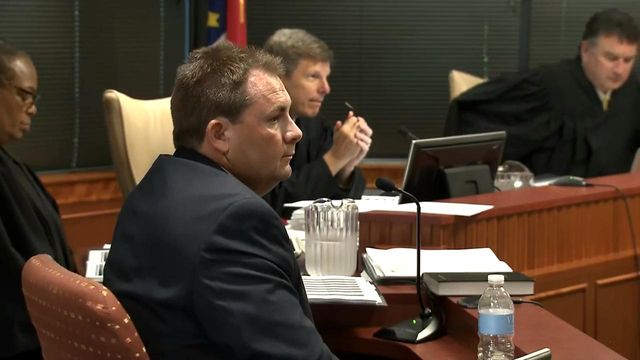House leader discounts influence of voting maps, says numerous veteran lawmakers in competitive districts
Republican Rep. David Lewis is in his ninth term in the state House, serves as chairman of the powerful House Rules committee and is a well-known and popular figure in his deeply red House district in Harnett County.
Posted — UpdatedYet, according to House Majority Leader John Bell, Lewis is among dozens of Republican House members in competitive districts.
Bell's testimony came Wednesday morning in the eighth day of a trial over the legislative voting district maps the Republican-controlled General Assembly approved two years ago. Common Cause North Carolina alleges that the maps are were drawn illegally into gerrymandered districts that favor GOP candidates.
Much of the trial to date has involved arcane testimony from statisticians, political science professors and other expert witnesses about hundreds of simulated elections, standard deviations and outliers as attorneys for Common Cause and state lawmakers spar over how much of a partisan advantage the House and Senate maps give to Republicans.
Bell, R-Wayne, was called to the stand by the defense Wednesday to put names and faces on the statistics and to rebut the notion that Republicans hold majorities in both legislative chambers simply because they rigged the maps in their favor. Democrats can't win districts because they are simply bad candidates, he said, not because of the district maps.
Trying to maximize GOP seats in the House would dilute Republican strength in many districts and would wind up costing the party seats, he said. That, would cause a revolt in the House Republican caucus, which on the best of days is like trying to manage a wheelbarrow full of frogs, he said.
Bell went through the 120 House districts and listed about 35 – all but a handful held by Republicans – he considered to be competitive in a race between random Democratic and Republican candidates. He defined competitive as "if I can win or not."
In addition to Lewis' district, he ticked off districts held by the following veteran lawmakers: Rep. Jimmy Dixon, R-Duplin, chairman of House Agriculture; Rep. George Cleveland, R-Onslow, chairman of House Homeland Security, Military and Veterans Affairs; Rep. Ted Davis, R-New Hanover, chairman of House Judiciary; Rep. John Szoka, R-Cumberland, senior chair of House Finance; Reps. Donny Lambeth, R-Forsyth, and Linda Johnson, R-Cabarrus, both senior chairs of House Appropriations; and Rep. John Torbett, R-Gaston, senior chairman of House Transportation.
Lewis, Dixon, Cleveland, Szoka and Torbett all won their races last fall by at least 58-42 percent margins. Lambeth and Johnson both won by 53-47 percent margins, while Davis squeaked by in a 49-47 percent race, according to the State Board of Elections.
Bell described many of the districts as socially conservative but insisted that incumbency played a critical role in the GOP holding on to them. He also balked when an attorney for Common Cause pointed out that President Donald Trump, former Gov. Pat McCrory and former presidential nominee Mitt Romney, all Republicans, carried some of the districts by 60-40 margins over Democrats Hillary Clinton, Gov. Roy Cooper and former President Barack Obama, respectively.
"You have to look at people. You have to look at issues. You have to look at the mood [of voters]. You have to look at incumbency. You have to look at what's going on," he said. "You're pulling statistics ... but if I've got a great candidate in that seat, I can win it and maintain it. If I have a horrible candidate in that seat, then we have problems."
Bell also noted he was looking at how competitive House districts would be without an incumbent in the race. When an attorney for Common Cause asked if that means Lewis and the others aren't running for re-election next year, an attorney for the lawmakers objected, citing confidentiality. Bell declined to say, when asked in a big picture sense, how many House seats now held by Republicans would be open in the 2020 election.
Related Topics
• Credits
Copyright 2024 by Capitol Broadcasting Company. All rights reserved. This material may not be published, broadcast, rewritten or redistributed.






